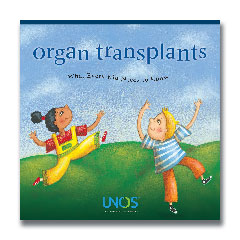- What happens next?
- Who is my main contact at the transplant center?
- How is a transplant center different from other hospitals?
- What is pediatric priority for a child waiting for a transplant?
- Are there other options for children on the transplant waiting list?
- How can I find other parents who may be in the same situation?
- How do I explain organ donation to my children?
My child needs a transplant. What happens next?
There are seven basic steps in the process before and during the transplant.
- Find a transplant center
- Get to know your transplant team
- Transplant evaluation
- The waiting list
- Waiting for a match
- The call (organ offer)
- Transplant surgery
How is a transplant center different from other hospitals?
A transplant center is a hospital that:
- Specializes in your child’s medical situation,
- Is most conveniently located for your child’s and family’s needs, and
- Will work with your insurance.
Talk to the doctor who referred your child for transplant for suggestions. You can also go to the Scientific Registry of Transplant Recipients (SRTR) website to find and compare transplant centers.
Who is my main contact at the transplant center?
Each transplant center is different, and so are the team members. At most centers, the transplant coordinator is your family’s point-person. The transplant coordinator assists and guides you and your family through the transplant process.
What is pediatric priority?
It may help for a child to join the transplant waiting list before they turn 18. This varies by organ type, but does affect kidney allocation. It is called pediatric priority. If a child starts dialysis before their eighteenth birthday but is added to the waiting list after they turn 18, they would not receive priority. Review OPTN kidney policy and check with your transplant team to see if this is an option.
Are there other options for children on the transplant waiting list?
If your child is a liver, kidney or lung transplant candidate, a living donor transplant is a possibility. If you, a family member, or friend is interested in being a living donor for you child, contact the transplant center for information on how to start the evaluation and testing for this process.
How can I find other parents who may be in the same situation?
Here are some tips for finding people with whom you can relate.
- Your transplant center may have online or in-person support groups, and they can give you the details.
- Talk to other parents that you may meet while your child is in the hospital. Those relationships can be some of the longest-lasting and helpful supports you’ll find. Other transplant parents may be aware of support resources that you don’t know about.
- You may not find many people in your area whose experiences are similar to your own, but there are many active communities on the Internet.
- Sites like transplantbuddies.org serve as a support system for transplant recipients and their families. You can also find support group listings and events on transplantliving.org.
- Talk to organizations that advocate for organ-specific transplant issues. Some of these groups run their own support forums on social media sites like Facebook.
- Other online transplant support groups may or may not be affiliated with an association or transplant center. Conduct a search and see what you find.
How do I explain organ donation to my children?
One way to tell younger children about transplantation is to explain that it is like changing the batteries in a favorite toy. Most children will have seen a parent do that or even helped their parents “replace a part” that no longer works.
Reinforce the idea that receiving an organ, either from a deceased or a living donor, is a special gift. Older children and teens may express a concern that “someone had to die for me to get an organ” through deceased donation. You can explain that the events that led to the donor’s death would have happened, whether or not your child needed an organ.

